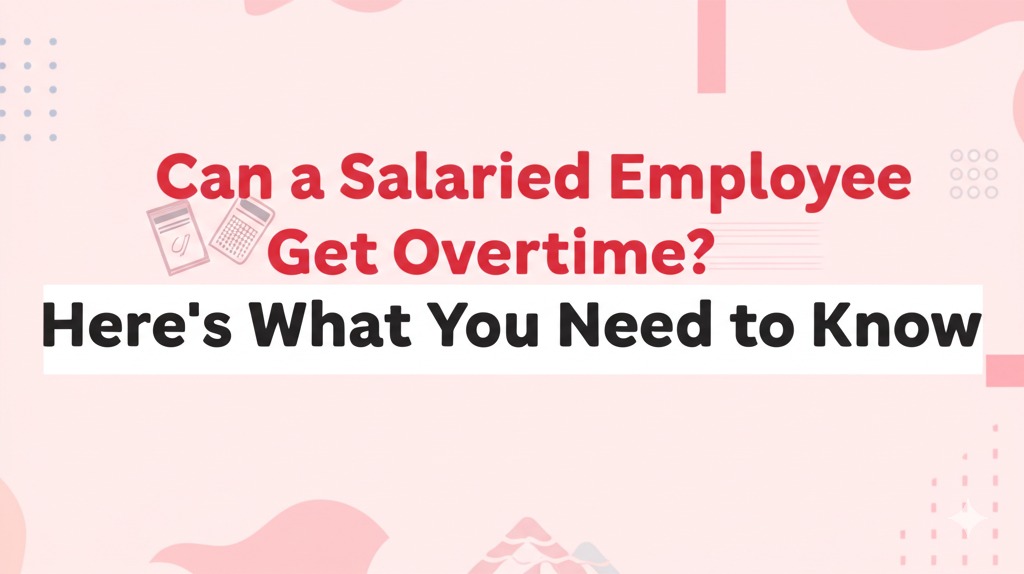
When most people hear the word “salaried,” they assume it means no overtime. But that’s not always the case. The rules around salaried employees and overtime pay are often misunderstood—and they can vary depending on your job duties, salary level, and employer policies.
In this article, we’ll break down whether salaried employees can get overtime, the legal framework behind it, and what you need to watch out for as an employee or employer. If you’re curious about your rights or responsibilities regarding overtime, you’re in the right place.
Understanding the Basics: Salaried vs. Hourly Employees
Before diving into overtime eligibility, let’s clarify the difference between salaried and hourly employees:
- Hourly employees are paid based on the number of hours worked. If they work over 40 hours in a workweek, they’re typically entitled to overtime pay.
- Salaried employees receive a fixed wage regardless of the number of hours worked each week.
This leads many to believe that salaried employees are automatically ineligible for overtime—but that’s not entirely true.
What Determines Overtime Eligibility?
The key factor isn’t whether you’re salaried or hourly—it’s whether you’re classified as “exempt” or “non-exempt” under the Fair Labor Standards Act (FLSA).
🏷️ Exempt Employees
Exempt employees do not qualify for overtime pay. To be classified as exempt, the following criteria usually apply:
- You earn at least $684 per week (as of 2020; this may change).
- You perform specific job duties that fall under categories like executive, administrative, professional, or outside sales.
- You’re paid on a salary basis, not hourly.
⏰ Non-Exempt Employees
Non-exempt employees are entitled to overtime pay—even if they’re salaried. Yes, you can be salaried and still eligible for overtime, as long as your job duties and salary do not meet the exemption criteria.
How Overtime Pay Works for Salaried Non-Exempt Employees
If you’re a salaried non-exempt employee, here’s how overtime usually works:
- You’re paid a fixed salary for a standard 40-hour workweek.
- Any time worked over 40 hours must be compensated at 1.5 times your regular hourly rate.
- To calculate your hourly rate, divide your weekly salary by 40.
Example:
If you earn $800 per week, your regular hourly rate is $20. Any overtime must be paid at $30 per hour ($20 × 1.5).
Common Jobs Where Salaried Employees Get Overtime
Not every salaried job is exempt from overtime. Many industries have salaried roles that are still eligible. Here are a few examples:
- Retail managers who don’t have hiring/firing authority
- IT support technicians
- Administrative assistants
- Healthcare support staff
- Construction supervisors without full managerial authority
If your role involves routine or manual work rather than independent decision-making or managing others, you may be non-exempt.
What Employers Need to Know
✅ Stay Compliant with FLSA Rules
Misclassifying employees can lead to costly lawsuits and penalties. Employers should regularly audit job descriptions, pay structures, and hours worked.
📊 Keep Detailed Records
Even for salaried non-exempt employees, tracking hours is essential. This ensures accurate overtime pay and avoids legal trouble.
💡 Consider the Impact on Morale
If salaried workers are expected to regularly work overtime without extra pay, burnout and dissatisfaction can quickly follow. Being clear and fair with compensation helps build trust and retention.
What Employees Should Do
🔍 Know Your Classification
If you’re unsure whether you’re exempt or non-exempt, ask your HR department or review your job description. You can also check the Department of Labor website for guidance.
📁 Document Your Hours
Even if you’re salaried, track your work hours—especially if you suspect you’re working over 40 hours a week without proper compensation.
⚖️ Take Action if You’re Being Denied Overtime
If you believe you’re being denied legally required overtime pay, consider:
- Talking to HR or management
- Consulting a labor attorney
- Filing a complaint with the Department of Labor
Frequently Asked Questions
❓ Can part-time salaried employees get overtime?
Yes, if they work over 40 hours in a workweek and are classified as non-exempt.
❓ Do all salaried employees lose their right to overtime?
No. Salaried does not automatically mean exempt. Eligibility depends on duties and earnings.
❓ Can an employer offer “comp time” instead of overtime pay?
Only in the public sector. Private employers are generally required to pay cash for overtime hours.
Final Thoughts: Know Your Rights and Responsibilities
So, can a salaried employee get overtime? The answer is yes—if they are classified as non-exempt under labor laws. Your job title or pay structure doesn’t automatically exclude you from overtime protections.
Understanding your classification can help ensure fair compensation and prevent workplace disputes. If you’re not sure where you stand, don’t hesitate to ask questions and seek guidance.
Need help reviewing your classification or handling an overtime dispute? Reach out to a labor law expert or HR professional today. Knowledge is power—and fair pay matters.

Andre Cuevas provides career insights, job search strategies, and professional advice to help individuals navigate the job market and achieve their career goals.






